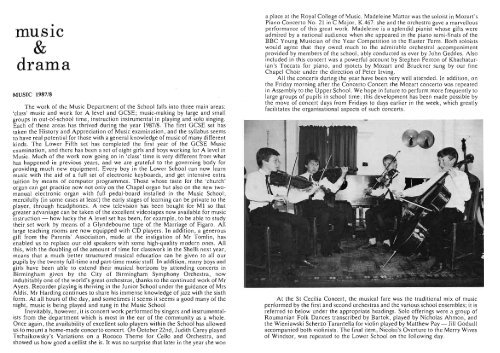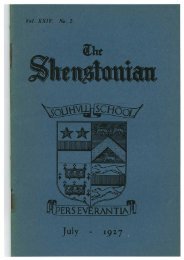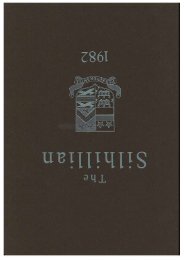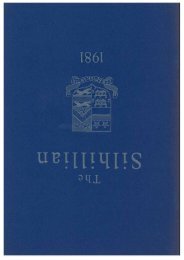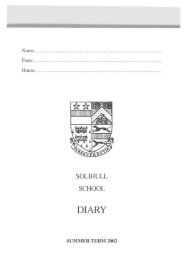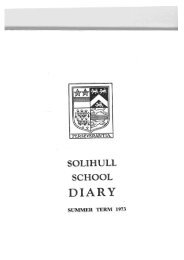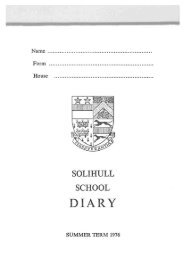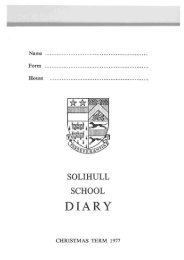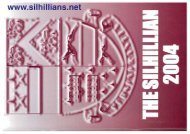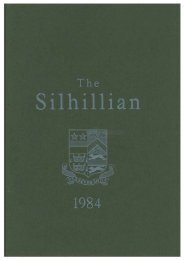SHENSTON IAN 88 - Old Silhillians Association
SHENSTON IAN 88 - Old Silhillians Association
SHENSTON IAN 88 - Old Silhillians Association
You also want an ePaper? Increase the reach of your titles
YUMPU automatically turns print PDFs into web optimized ePapers that Google loves.
music<br />
drama<br />
MUSIC 1987/8<br />
The work of the Music Department of the School falls into three main areas:<br />
'class' music and work for A level and GCSE; music-making by large and small<br />
groups in out-of-school time, instruction instrumental in playing and solo singing.<br />
Each of these areas has thrived during the year 1987/8. The first GCSE set has<br />
taken the History and Appreciation of Music examination, and the syllabus seems<br />
to have real potential for those with a general knowledge of music of many different<br />
kinds. The Lower Fifth set has completed the first year of the GCSE Music<br />
examination, and there has been a set of eight girls and boys working for A level in<br />
Music. Much of the work now going on in 'class' time is very different from what<br />
has happened in previous years, and we are grateful to the governing body for<br />
providing much new equipment. Every boy in the Lower School can now learn<br />
music with the aid of a full set of electronic keyboards, and get intensive extra<br />
tuition by means of computer programmes. Those whose taste for the 'church'<br />
organ can get practice now not only on the Chapel organ but also on the new twomanual<br />
electronic organ with full pedal-board installed in the Music School;<br />
mercifully (in some cases at least) the early stages of learning can be private to the<br />
player, through headphones. A new television has been bought for M1 so that<br />
.greater advantage can be taken of the excellent videotapes now available for music<br />
instruction — how lucky the A level set has been, for example, to be able to study<br />
their set work by means of a Glyndebourne tape of the Marriage of Figaro. All<br />
large teaching rooms are now equipped with CD players. In addition, a generous<br />
gift from the Parents' <strong>Association</strong>, made at the instigation of Mr Tomlin, has<br />
enabled us to replace our old speakers with some high-quality modern ones. All<br />
this, with the doubling of the amount of time for classwork in the SheM next year,<br />
means that a much better structured musical education can be given to all our<br />
pupils by the twenty full-time and part-time music staff. In addition, many boys and<br />
girls have been able to extend their musical horizons by attending concerts in<br />
Birmingham given by the City of Birmingham Symphony Orchestra, now<br />
indubitably one of the world's great orchestras, thanks to the continued work of Mr<br />
Ayers. Recorder playing is thriving in the Junior School under the guidance of Mrs<br />
Aldis. Mr Harding continues to share his immense knowledge of jazz with the sixth<br />
form. At all hours of the day, and sometimes it seems it seems a good many of the<br />
night, music is being played and sung in the Music School<br />
Inevitably, however, it is concert work performed by singers and instrumentalists<br />
from the department which is most in the ear of the community as a whole.<br />
Once again, the availability of excellent solo players within the School has allowed<br />
us to mount a home-made concerto concert. On October 22nd, Judith Carey played<br />
Tschaikowsky's Variations on a Rococo Theme for Cello and Orchestra, and<br />
showed us how good a cellist she is. It was no surprise that later in the year she won<br />
a place at the Royal College of Music. Madeleine Mattar was the soloist in Mozart's<br />
Piano Concerto No. 21 in C Major, K.467: she and the orchestra gave a marvellous<br />
performance of this great work. Madeleine is a splendid pianist whose gifts were<br />
admired by a national audience when she appeared in the piano semi-finals of the<br />
BBC Young Musician of the Year Competition in the Easter Term. Both soloists<br />
would agree that they owed much to the admirable orchestral accompaniment<br />
provided by members of the school, ably conducted as ever by John Geddes. Also<br />
included in this concert was a powerful account by Stephen Penton of Khachaturian's<br />
Toccata for piano, and motets by Mozart and Bruckner sung by our fine<br />
Chapel Choir under the direction of Peter Irving.<br />
All the concerts during the year have been very well attended. In addition, on<br />
the Friday morning after the Concerto Concert the Mozart concerto was repeated<br />
in Assembly to the Upper School. We hope in future to perform more frequently to<br />
large groups of pupils in school time; this development has been made possible by<br />
the move of concert days from Fridays to days earlier in the week, which greatly<br />
facilitates the organisational aspects of such concerts.<br />
At the St Cecilia Concert, the musical fare was the traditional mix of music<br />
performed by the first and second orchestras and the various school ensembles; it is<br />
referred to below under the appropriate headings. Solo offerings were a group of<br />
Roumanian Folk Dances transcribed by Bartok, played by Nicholas Ahmod, and<br />
the Wieniawski Scherzo Tarantella for violin played by Matthew Pay —Jill Godsall<br />
accompanied both violinists. The final item, Nicolai's Overture to the Merry Wives<br />
of Windsor, was repeated to the Lower School on the following day.


